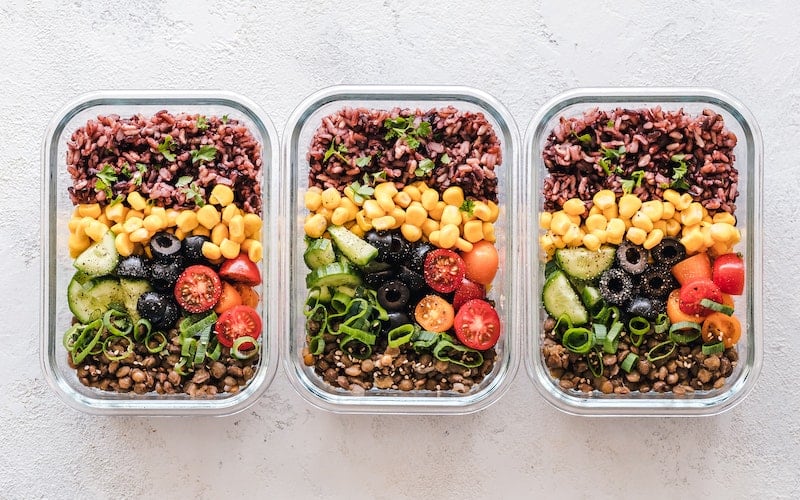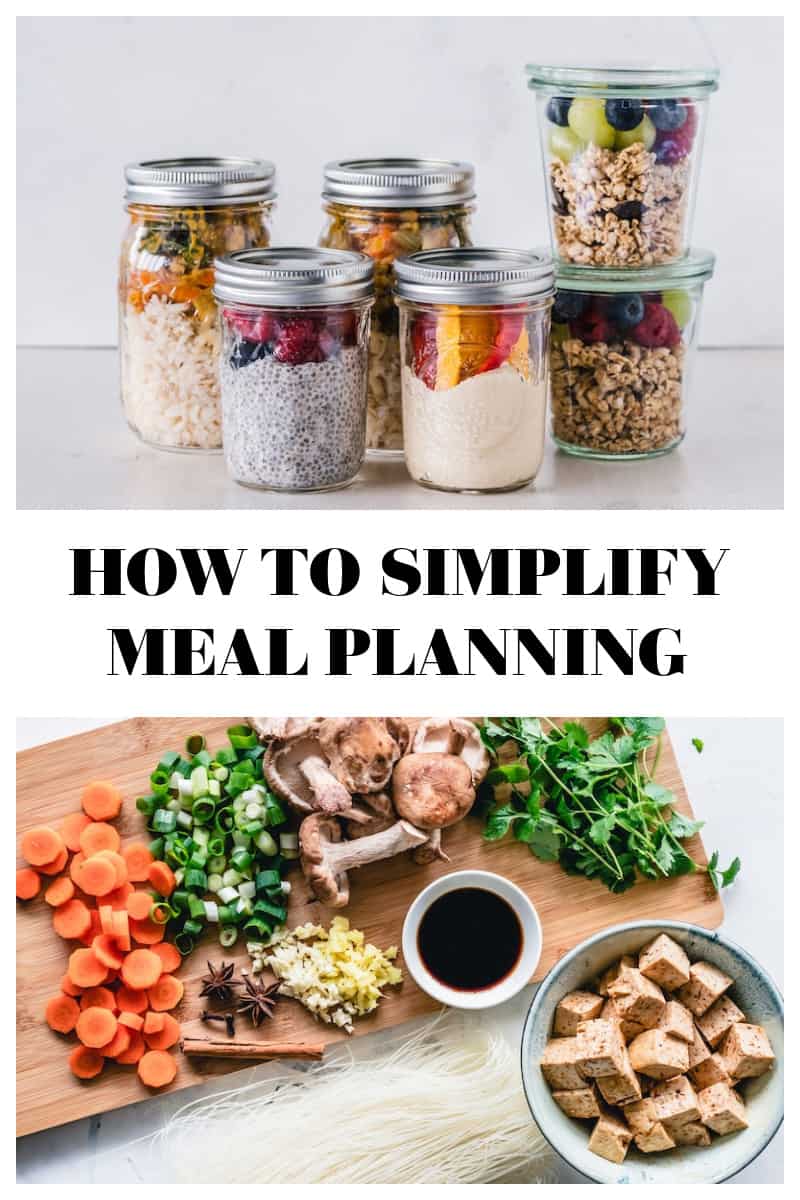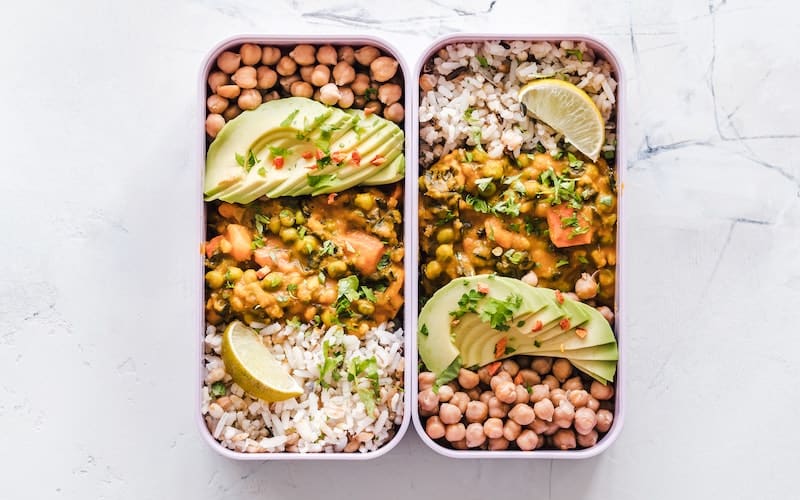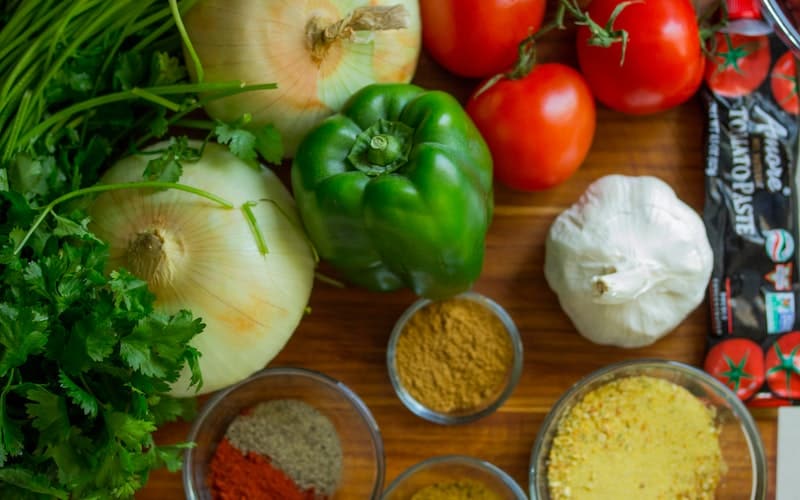Last Updated on May 11, 2023 by ellen
Simplify meal planning with these helpful tips. Find out how to make a weekly meal plan to save time in the kitchen and eliminate wasted food.
Posts may be sponsored. This post contains affiliate links, which means I will make a commission at no extra cost to you should you click through and make a purchase. As an Amazon Associate I earn from qualifying purchases.

Table of Contents
How to Simplify Meal Planning
Meal planning can take quite a bit of time each week. Here are some tips you can use to create a meal planning system that works for your family.
Create your own minimalist meal plan that will help you come up with new meal ideas and include your favorite meals. With a meal plan, you will have fewer decisions to make at the end of the day.
What is a meal plan?
A meal plan is a list of meals and snacks you make for yourself for the week. It helps to have a general idea of what you will be eating each day, so that you can shop for groceries more efficiently and cook accordingly.
What is a minimalist meal plan?
A minimalist meal plan is a system of planning meals that only requires minimal effort. It encourages you to make fewer decisions about what food to buy and cook, so that you can spend more time enjoying your meal.
A minimalist meal plan includes simple recipes with basic ingredients and few steps in the preparation process.

Do I need to eat the same meals all the time?
No! You can still enjoy variety while following a minimalist meal plan. Try to include different flavors, textures, and colors in your meals. This will keep them interesting and help you stay motivated to stick with the plan.
Tips for meal planning with picky eaters
If you’re meal planning with picky eaters, it can be difficult to know what to include in the plan. Here are some tips that may help:
- Involve them in the process of creating the meal plan and selecting recipes.
- Offer a variety of food options so they can have something that appeals to their tastes.
- Incorporate recipes that are easy to customize, like tacos or stir-fries.
- Serve foods in fun shapes or with dips and sauces.
- Don’t be afraid to make an adventurous meal every once in a while!
Do I need to meal plan all the meals?
No. You don’t have to plan every single meal for the week. Instead, try to plan a few meals that you can rotate throughout the week. This will save time and make it easier to shop and prepare meals.
If you know you always have the same foods for breakfast, you can leave breakfast out of your meal planning. We love granola and overnight oats. Just be sure you add those foods to your shopping list.

Benefits of meal planning
Meal planning has many benefits, including:
- Saving time by having a plan for meals.
- Reducing food waste by using ingredients in the plan.
- Eating healthier meals because you are making conscious choices about what to eat.
- Having fewer last-minute trips to the grocery store or takeout runs.
- Reducing stress when it comes time to decide what’s for dinner.
- Keeping grocery costs down by buying only the ingredients you need.
Meal planning can help streamline your weekly routine and make sure your family has delicious, healthy meals every night.

Tips to simplify meal planning
Keep a grocery list and stock your pantry with staples. This will make it easier to come up with meals without having to buy extra ingredients each time you plan a meal.
Use the right tools. These containers are very helpful when meal planning. They are easy to stack and are the best size for dinner and lunch.
Make one big grocery shopping trip a week instead of multiple trips. When you have all the ingredients for the week’s meals in one place, it’s easier to stick to your meal plan.
Get your family’s input. Make sure you include your family’s favourite meals when you meal plan. This will lead to less stress at dinner time.
Prepare meals ahead when you have time and store them in the freezer for easy access during the week. Don’t forget to keep cut up veggies available to help you eat healthy. This will make your life easier on busy days.
Plan simple meals that require minimal cooking time. This will save you time and energy while still delivering a delicious meal. A minimalist meal plan involves simple meal planning with healthy food choices.
Watch individual portions. You don’t want to waste food. Try to use up ingredients from previous meals in the following day’s meal. This will help you save money and reduce food waste.

Be flexible. Don’t be afraid to switch up your meal plan if you don’t have the ingredients or energy to cook what was planned. Keep the basics on your grocery list so you’re prepared.
Avoid complicated meals. Stick to recipes that you can make in one pot or with a few ingredients.
Meal planning doesn’t have to be time-consuming. One pot meals are perfect when you are rushed at dinner time.
Eat leftovers. We chose Saturday night as left overnight. This is a great way to reduce food waste and cut down on the amount of cooking you have to do.
Try different foods. You don’t need to eat the same things every week. Don’t be afraid to try a new recipe every now and then.

Include your favorite meals
When creating a meal plan, make sure that you include your favorite meal ideas. These are our go to meals we enjoy having every week.
- Homemade pizza
- Black beans and rice
- Chicken or beef stir fry with vegetables
- Spaghetti and meatballs
- Tacos (meatless or with meat)
- Pasta salad
- Cast iron skillet corn with chicken
Capsule pantry list
Having a capsule pantry list is an easy way to make sure you always have the ingredients for your favorite meals on hand. Start by making a list of staples that you can use to create several different dishes.
Then, stock up on these items so that when it comes time to plan meals, you already have everything you need. When you simplify meal planning, here are some examples of items you may want to include on your list:
Grains – rice, quinoa, oats
Legumes – beans, lentils
Nuts and seeds – almonds, walnuts, pumpkin seeds

Fresh vegetables and fruit – carrots, spinach, apples
Frozen vegetables and fruit – broccoli, berries
Canned goods – tomatoes, broth
Herbs and spices – garlic, oregano, basil
Condiments – olive oil, soy sauce, vinegar
Protein – Chicken, beef, beans, fish
Breakfast foods – Oatmeal, fresh fruit, eggs, bread
Once you have your list of staples ready to go, it will be much easier to come up with quick and easy meals throughout the week. If you find your self with decision fatigue when making dinner, try a few of these minimalist meal planning tips.

Ellen is a mom of a 25-year-old son and 30-year-old daughter. She is Grandma to one adorable toddler. In what little spare time she has, she loves to read, watch movies, and check out the latest toys and games.
